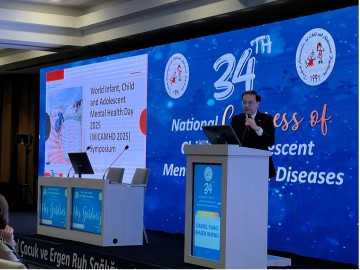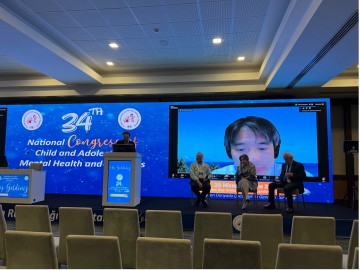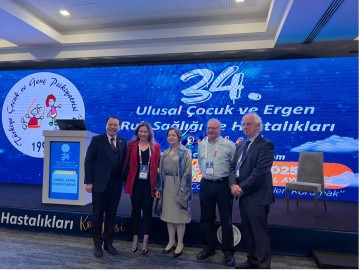Children in Crisis: The Mental Health Impact of Displacement: Insights from World Infant, Child and Adolescent Mental Health Day (WICAMHD) 2025
Kuşadası, Türkiye – 29 April 2025 — As part of the 34th Annual Meeting of the Turkish Association of Child and Adolescent Psychiatry, the 2025 edition of World Infant, Child and Adolescent Mental Health Day (WICAMHD) convened global experts to spotlight the urgent and growing crisis of child and youth mental health in the context of displacement.
Now in its Fourth edition, WICAMHD is co-organised by four leading international organisations:
- The International Association for Child and Adolescent Psychiatry and Allied Professions (IACAPAP)
- The World Psychiatric Association Child and Adolescent Psychiatry Section (WPA-CAP)
- The International Society for Adolescent Psychiatry and Psychology (ISAPP)
- The World Association for Infant Mental Health (WAIMH)
Together, they call for urgent action to protect the mental wellbeing of children forced from their homes due to war, environmental disaster, and systemic inequities.
1. Global Perspectives
The Current Crisis
Displacement is increasingly driven by armed conflict, climate change, and poverty. Children, especially from indigenous and marginalised communities, face elevated risks of trauma, disconnection, and long-term mental health challenges. The over-representation of Native Hawaiian youth among the homeless in O‘ahu, as highlighted by speakers, is one such example.
Cross-Cultural Relevance
Presenters emphasized the need for culturally sensitive approaches that respect family systems, traditional healing, and local knowledge—moving beyond “one-size-fits-all” models.
Advocacy and Outreach
WICAMHD affirms IACAPAP’s ongoing role in promoting rights-based, inclusive care frameworks that prioritise the needs of displaced and underserved youth worldwide.
2. Evidence-Based Approaches
Research and Disparities
Dr. Anthony Guerrero (USA) highlighted disparities caused by poverty, stigma, and systemic neglect, showing links to incarceration, suicide, and academic failure among youth.
Digital Innovation and Community Models
From telehealth to peer-based interventions, evidence points to scalable innovations that can expand access in low-resource or high-displacement settings.
Video Feature:
A deeply moving video, “A Syrian Teenager Interviews Her Mother”, presented with permission from the International Rescue Committee, captured the personal courage and trauma behind the statistics.
📽️ Watch here
3. Critical Challenges
- Access to Care: Mental health services are often unavailable or inaccessible to displaced children.
- Language and Cultural Barriers: Misdiagnosis and disengagement frequently arise from cultural mismatches.
- Resource Gaps: Most systems are under-resourced for the specialised needs of young people.
- Coordination Challenges: Fragmented services across sectors (health, education, protection) create gaps in care.
4. Practical Solutions
- Scalable Models: Low-intensity interventions, such as task-shifting and sharing and group therapy, can be deployed quickly and effectively.
- Frontline Training: Teachers and humanitarian workers must be equipped to provide psychological first aid and referral support.
- Family-Centred Care: Strengthening family unity and parental resilience was a recurring theme throughout the day.
- Technology-Enabled Care: Apps, SMS support, and remote consultations can bring mental health support to hard-to-reach populations.
5. WICAMHD 2025 Programme Highlights
Opening Remarks:
- Professor Daniel Fung (Singapore), Organising Chair
Welcome and Introductions:
- Professor Luis Rohde (Brazil), IACAPAP President
Featured Video:
- “A Syrian Teenager Interviews Her Mother” – International Rescue Committee (YouTube)
Key Presentations:
- Professor Anthony Guerrero (USA, WPA-CAP): “Finding Opportunities Globally to care for youth vulnerable to displacement”
- Professor Füsun Çetin Çuhadaroğlu (Türkiye, ISAPP): “The Challenges of Displacement for Adolescents”
- Professor Campbell Paul (Australia, WAIMH): “Understanding the Infant and Family Experience of Forced Displacement: The Role of Mental Health Services”
- Professor Matthew Hodes (UK, IACAPAP): “Support for Displaced Children and Families: Personal Reflections on What We've Learnt and Where We're Going”
- Dr. Chiara Servili (WHO): “Building Systems for Young People’s Mental Health in Setting Affected by Displacement”
Panel Discussion
Moderated by Professor Daniel Fung and joined by all speakers, this session integrated global insights into actionable recommendations for practitioners and policymakers.

Figure 1: Opening remark by the World Infant, Child and Adolescent Mental Health Day (WICAMHD) 2025 Organising Chair, Dr Daniel Fung

Figure 2: Panel Discussion at the WICAMHD 2025 Symposium. From right to left: Dr Daniel Fung, Dr Anthony Guerrero, Dr Matthew Hodes, Dr Fusun Çetin Çuhadaroğlu and Dr Campbell Paul.

Figure 3: Closing of the WICAMHD 2025 Symposium. From right to left: Dr Daniel Fung, Dr Neslihan İnal, Dr Fusun Çetin Çuhadaroğlu, Dr Matthew Hodes and Dr Campbell Paul.
About WICAMHD
World Infant, Child and Adolescent Mental Health Day (WICAMHD) is a global initiative launched by IACAPAP and partners to highlight the mental health needs of the youngest populations. Marked each year on 23 April, WICAMHD seeks to galvanise advocacy, research, and coordinated action across nations.

